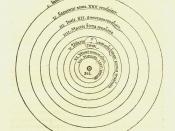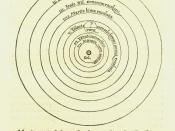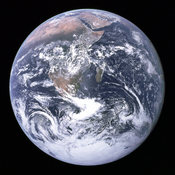"It was perhaps in the world of thought that the revolution accomplished from Copernicus to Newton was most profound. It has been called the greatest spiritual readjustment that the human beings have been required to make"� (Palmer 297).
Ancient conception of the cosmos had been based on the geocentric theory, a theory that claimed that bodies within the solar system revolved around the Earth. This belief had generally been unquestioned since the second century. However, the ancient belief was challenged when Nicholas Copernicus, a fourteenth century scientist, suggested the heliocentric (sun-centered) theory. Copernicus' heliocentric theory began a trend of researching scientists and thus the scientific revolution had developed. The scientific revolution, the time between Copernicus and Isaac Newton, bewildered the world's long-established beliefs but simultaneously, gave more confidence to human ability.
Copernican theory had been validated by the studies of Kepler and thence, expanded upon by Galileo. Galileo, with the aid of his telescope, discovered that other planets, moons, and stars were not luminous objects.
In fact, they appeared to be made up of substances like the earth. This defied the idea that objects in space, created by God, are heavenly in comparison to the earth. "The difference between the earth and the heavens was disappearing. This struck a terrifying blow at all earlier philosophy and theology"� (Palmer 286). This quote shows the religious confusion that scientific studies had brought upon the people. Also, the sky proved to be empty, dark space instead of luminaries that people once believed in. In addition, Copernican theory had initially defied the notion that the earth was the center of creation. Therefore, humans were regarded as trivial in comparison to the endless universe. "The gap between Christianity and natural sicience, always present yet always bridged in the Middle Ages, now opened wider than...


